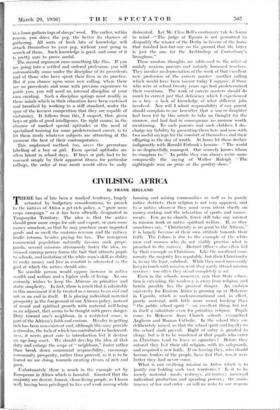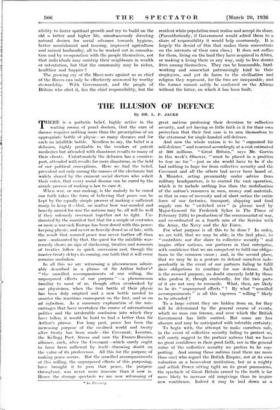CIVII.ISING AFRICA
By FRANK MELLAND
No sensible person would oppose increase in native wealth and welfare and a higher scale of living. No one seriously wishes to keep the Africans in primitive and static simplicity, In fact, there is much that is admirable in this movement if it be treated as a means to an end and not as an end in itself. It is placing individual material prosperity in the foreground of our African policy, instead of moral and spiritual growth with material well-being as an adjunct, that seems to be fraught with grave danger. Duty toward one's neighbour, in a restricted sense, is part of the African's faith and custom. Rivalry in getting rich has been non-existent and, although this may provide a stimulus, the lack of which has contributed to backward- ness, it needs great care in introduction lest it destroy an age-long asset. We should develop the idea of that duty and enlarge the scope of " neighbour," foster rather than break down communal responsibility, encourage community prosperity, rather than proceed, as it is to be feared we are doing, towards creating classes of rich and poor.
Unfortunately there is much in the example set by Europeans in Africa which is harmful. Granted that the majority are decent, honest, clean-living people, as I know well, having been privileged to live and work among white farming and mining communities as well as in purely native districts, their religion is not very apparent, and to a native observer they must seem intent chiefly on money-making and the relaxation of sports and amuse- ments. Few go to church, fewer still take any interest in mission work or native spiritual welfare. If, as they sometimes say, " Christianity is no good to the African," it is largely because of their own attitude towards their faith. The failure is due to the example of the white men and women who do not visibly practise what is preached to the natives. District Wilms also often fail by their example as Christians. Like the unofficial com- munity the majority live reputably, but their Christ ianity is, to say the least, subdued. While they niti,t tierey,arily keep in touch with mission work they rarely at t end nassion services : too often they stand completely a' Jot'.
Even in the schools, moreover, now that State educa- tion is extending, the tendency is away from religion, and herein possibly lies the greatest danger. An embryo university for Eastern Africa is growing up at Makerere in Uganda, which is undenominational and, in effect, purely material, with little more moral backing than " the public school spirit "—an excellent thing, but not in itself a substitute even for primitive religion. Pupils come to Makerere from Church schools—evangelical Anglican and Roman Catholic. In the school they are deliberately mixed, so that the school spirit and loyalty to the school shall prevail. Right of entry is granted to clergy, but is it to be wondered at that pupils who enter as Christians tend to leave as agnostics ? Before they entered they lost their old religion, with its safeguards, and acquired a new faith. If on leaving they, who should become leaders of the people, have lost that, too, it were better they had never conic.
What is our civilising mission in Africa which is to justify our holding such vast territories ? Is it to be merely material—roads, railways, air-routes ; increased individual production and spending powers ; the main- tenance of law and order—or will we wake to our respon- .sibility to foster spiritual growth and try to build on the old a better and higher life, simultaneously directing natural desires for social advance towards hygiene, better nourishment and housing, improved agriculture and animal husbandry, all to be worked out in consulta- tion and by co-operation with the people themselves, not that individuals may outstrip their neighbours in wealth or ostentation, but that the community may be richer, healthier and happier ?
The growing cry of the Have-nots against us as chief of the Haves can only be effectively answered by worthy stewardship. With Government, and the people of Britain who elect it, lies the chief responsibility, but the resident white population must realise and accept its share. (Parenthetically, if Governinent would adMit nein to a share of responsibility it would help enormously. It is largely the denial of this that makes them concentrate on the interests of their own class.) It does not suffice for them, living on the land theyhave acquired in Africa, or making a living there in any way, only to live 'dec'(etit lives among themselves. They can be honourable, Mid- working and somewhat patronisingly kind to 'their employees, and yet do harm to the civilisation and religion they represent, for the two are inseparable,. and the former cannot safely be conferred on the Afritan without the latter, on which it has been built.



































































 Previous page
Previous page